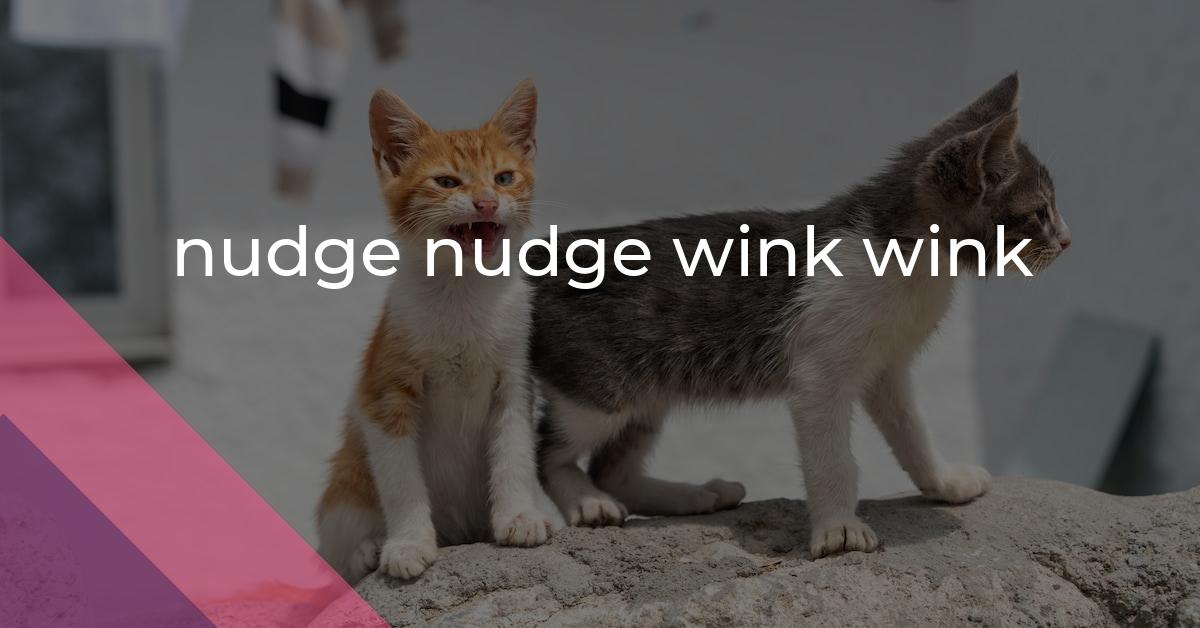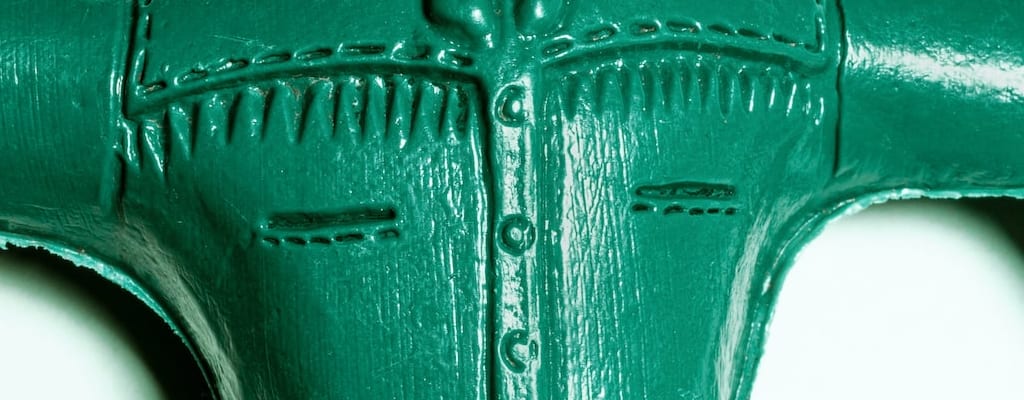nudge nudge wink wink: Idiom Meaning and Origin
What does ‘nudge nudge wink wink’ mean?
The idiom "nudge nudge wink wink" is a humorous phrasal expression used to imply an understanding between two people about a secret or hidden meaning, usually of a suggestive or flirtatious nature.

Idiom Explorer
Tip the wink means to give a secret signal or hint to someone, usually in a sly or discreet manner.
The idiom "on the same wavelength" means to have a similar understanding or thinking as someone else, often resulting in effective communication or collaboration.
The idiom "on the Q.T." means to do something secretly or discreetly, without drawing attention or causing others to notice.
The idiom "one's jig is up" means that someone's deception or secret has been exposed and they can no longer continue with their plan or scheme.
The idiom "on a whim" means doing something without any prior planning or thought. It refers to a spontaneous decision or action that is often impulsive and not based on any rational reasoning.
The idiom "now you're talking" means that someone is finally saying or suggesting something desirable, favorable, or more in line with one's expectations or desires.
The idiom "now you mention it" is used to acknowledge that the speaker has just remembered or noticed something that was previously mentioned. It implies that the speaker hadn't thought about it until it was brought up.
The idiom "nod off" means to fall asleep unintentionally or briefly. It refers to the action of involuntarily lowering one's head or nodding in a sleepy or unconscious manner.
When someone has a nodding acquaintance with someone or something, it means they have a very brief or superficial knowledge or familiarity with them. It implies a passing or casual connection rather than a deep or meaningful relationship.
Nudge's Secret Gestures
The idiom "nudge nudge wink wink" is a playful expression that suggests something indirectly or implies a hidden meaning. It is often accompanied by the physical actions of nudging with the elbow and winking with one eye, which emphasize the underlying subtext. This idiom is commonly used in humorous or flirtatious contexts, adding a touch of cheekiness or innuendo to the conversation.
The phrase "nudge nudge wink wink" originated in British English and gained popularity in the United Kingdom and other English-speaking countries. It became widely recognized through its use in the Monty Python sketch "Nudge Nudge" in 1969, part of their iconic television series. Terry Jones played the role of a man who constantly made suggestive remarks to another character, played by Eric Idle.
While the specific origins of the idiom prior to the Monty Python sketch are unclear, it is believed to have evolved from the physical gestures of nudging and winking, which have long been associated with conveying hidden messages. Nudging someone with the elbow discreetly draws attention to or reinforces a shared understanding of an implicit meaning, while winking can signal complicity or mutual understanding.
When used in conversation or writing, the idiom "nudge nudge wink wink" serves as a humorous way to suggest something without being explicit. It allows the speaker or writer to imply a hidden meaning or innuendo while maintaining plausible deniability. This makes it well-suited for situations where the speaker may want to tiptoe around a sensitive or taboo subject, or simply inject a lighthearted and playful tone to the interaction.
This idiom has become ingrained in popular culture and is often referenced in various forms of media, including television shows, films, and literature. Its familiarity and widespread recognition make it a powerful tool for comedic effect, allowing writers and performers to tap into the audience's collective understanding and appreciation of the idiom's underlying meaning.
The idiom "nudge nudge wink wink" encapsulates the art of suggestion and hidden meaning. It combines the physical actions of nudging and winking with a playful and cheeky expression, allowing for subtle or risqué implications without explicitly stating them. Its origins may be traced back to the physical gestures themselves, but it gained significant recognition through its association with the Monty Python sketch of the same name. This idiom has found its place in popular culture and continues to be used as a tool for humor and innuendo, providing a valuable means of conveying a subtextual message in a playful and indirect manner.
The idiom "nudge nudge wink wink" is related to several other idioms. One such idiom is "tip the wink," which means to discreetly give someone a hint or secret information. When using "nudge nudge wink wink," a person may "tip the wink" by giving a subtle clue or indication.
Another related idiom is "in the wink of an eye," which means very quickly or instantly. When someone uses "nudge nudge wink wink," they may suggest something will happen "in the wink of an eye," creating an expectation of a swift occurrence.
"get a wiggle on" is another idiom related to "nudge nudge wink wink." It means to hurry up or get moving. When employing "nudge nudge wink wink," the speaker may encourage others to "get a wiggle on" and act without delay.
The idiom "forty winks" is also related to "nudge nudge wink wink." It refers to a short nap or a brief period of sleep. When utilizing "nudge nudge wink wink," someone may suggest they need to take "forty winks" as a playful way of saying they require some rest.
The final idiom related to "nudge nudge wink wink" is "nip and tuck." It means a close or tight race, often used in the context of a competition. When incorporating "nudge nudge wink wink," the speaker may describe a situation as a "nip and tuck" affair, implying a closely contested battle or race.
Example usage
- "We all know that she got that promotion because of her 'connections' *nudge nudge wink wink*."
- "He always seems to have insider information about the company's plans *nudge nudge wink wink*."
- "Did you see how quickly they reached a settlement? Must have been some secret negotiations going on *nudge nudge wink wink*."
More "Slang" idioms



